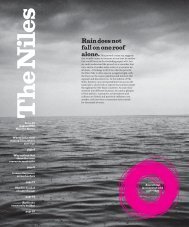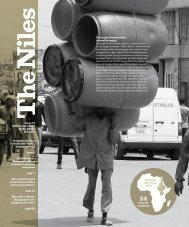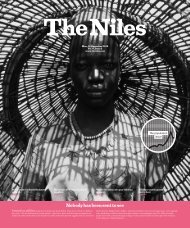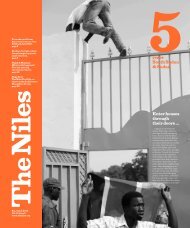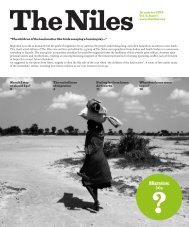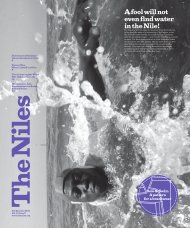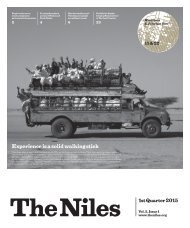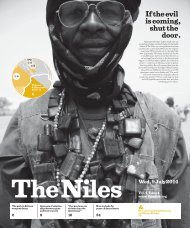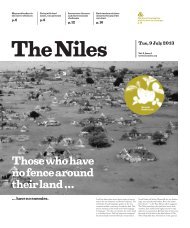We are what we eat
The food we eat literally determines who we are. It influences our physical, mental and even emotional well-being. From Egypt’s Cairo to Burundi’s Gitega, this issue of The Niles attempts to explore the essentials of food: from conflict and food insecurity to the sensory aspects of preparing and eating national dishes.
The food we eat literally determines who we are. It influences our physical, mental and even emotional well-being. From Egypt’s Cairo to Burundi’s Gitega, this issue of The Niles attempts to explore the essentials of food: from conflict and food insecurity to the sensory aspects of preparing and eating national dishes.
You also want an ePaper? Increase the reach of your titles
YUMPU automatically turns print PDFs into web optimized ePapers that Google loves.
With the world’s
population expected
to reach 9.7
billion by 2050,
insects will become
a vital source
of nourishment.
Add crickets to your diet
for more protein
With populations growing and resources shrinking,
scientists are turning to insects as a nutritious food
alternative.
Rehab Abd Almohsen
Cairo, Egypt
In Nile Basin countries, insects play the role of
organic fertilisers, animal feed, and sometimes,
as food for humans.
Muniirah Mbabazi, a researcher in the
Department of Food and Science at Makerere
University in Uganda, wonders why don’t more
people eat insects. “Edible insects remain one of the
lowly tapped food resources in this region.”
Mbabazi explained that insects are a rich source
of essential fatty acids and minerals like iron.
“In diets that are deficient in protein, edible insects
may be an important alternative, as they may
supply over 50 gram of protein per 100 gram
of edible insects.”
In East Africa, grasshoppers, termites or white
ants, palm weevil larvae, bee larvae, and lake flies
are good sources of food, while lepidoptera larvae
and locusts are common in Central and Northern
Africa respectively.
Mbabazi wrote a paper “Edible insects in Eastern
and Southern Africa: challenges and opportunities”
as part of her contribution in the book “Sustainable
Diets and Biodiversity” published by the Food and
Agriculture Organization (FAO).
Since 2003, FAO has been working on promoting
edible insects in many countries worldwide, to deal
with the predicted population increase to 9.7 billion
people by 2050.
“Crickets need a sixth less feed than cattle, four
times less than sheep, and half the amount that
pigs and broiler chickens need to produce the same
amount of protein, according to FAO. Insects also
emit fewer greenhouse gases and ammonia than
conventional livestock. They can also be grown on
organic waste.
Another advantage of insects Mbabazi pointed
out, is that harvesting insects from the wild can
fetch over USD 10 for one kilogram of insects
and offer not only a cheap source of protein to lowincome
households but also an alternate source
of income.
Making crickets attractive to customers
Flying Food, a project based in Kenya and
Uganda since 2013, set up small scale insect rearing
stations at farms, raised crickets that can be eaten
whole, but also dried and ground into a flour to serve
as an ingredient for new food products, such as
blend flour, cakes, samosas and meatballs, according
to their website.
The project has a business model that allows
people in the region with low incomes to participate
by rearing healthy crickets for food, then learning
processing and product development to make
crickets more attractive to the customers – for
example, selling cricket flour that can be used
in e.g. chapatis or irio cakes, and marketing.
“With the keen interest around the world on
entomophagy,” says Mbabazi, “regulatory frameworks
on the use and conservation of insects
in areas such as biodiversity conservation, disease
control, Integrated Pest Management (IPM),
sanitation, pest eradication and the health sector
are being developed.”
12
TN14_20191203_II.indd 12 2019/12/03 10:08









